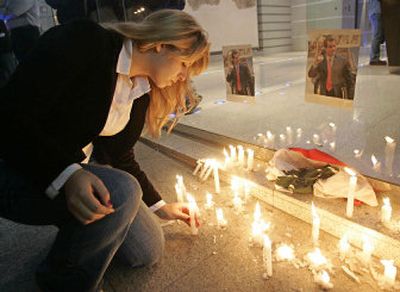Lebanese editor killed by car bomb

BEIRUT, Lebanon – Journalist and lawmaker Gibran Tueni, a relentless critic of Syria who spent months in France fearing assassination, was killed Monday in a car bombing – only a day after returning to his homeland.
A previously unknown group claimed responsibility, but suspicion quickly settled on Syria, where the state-controlled media has been highly critical of anti-Syrian reports by Lebanese journalists.
The slaying silenced the blistering editorial voice of Tueni, the 48-year-old general manager of Lebanon’s leading newspaper, An-Nahar, founded in 1933 by his grandfather.
His motorcade was attacked hours before the United Nations released a follow-up report on its probe of the February car bomb assassination of former Prime Minister Rafik Hariri.
The report by chief U.N. investigator Detlev Mehlis, who earlier implicated Syria in the killing, said new evidence reinforced investigators’ belief that Syrian and Lebanese intelligence likely knew about the Hariri killing in advance.
The new report accused Syria of trying to obstruct the probe by demanding it revise earlier findings after a crucial witness recanted.
After Mehlis’ earlier report, the U.N. Security Council warned Syria it would face further action – possibly including sanctions – if it didn’t cooperate fully.
Tueni was one of the hundreds of witnesses who were interviewed by Mehlis. An earlier Mehlis report reported Tueni as saying he was told by Hariri that Syrian President Bashar Assad had threatened the Lebanese leader directly.
While Syria has denied involvement in both killings, the United States, France and Tueni’s Lebanese allies said the slaying would not distract them from pressuring Syria to cooperate with the U.N. inquiry.
President Bush condemned the slaying as a murderous act “aimed at subjugating Lebanon to Syrian domination and silencing the Lebanese press.” He insisted that Syria comply with U.N. Security Council resolutions calling for an end to its interference in Lebanon “once and for all.”
British Foreign Secretary Jack Straw, speaking for the European Union, said the perpetrators “who seek to destabilize Lebanon and the region through such cowardly attacks will not succeed.”
France indicated it would push ahead with efforts against Syria at the Security Council, which condemned the slaying and called Tueni an “outspoken symbol of freedom and the sovereignty and political independence of Lebanon.”
U.N. Secretary-General Kofi Annan expressed shock and dismay at the “cold-blooded murder” and said those responsible must be brought to justice. Condemnation also came from Reporters Without Borders, the Committee to Protect Journalists and Amnesty International.
Lebanese Prime Minister Fuad Saniora held emergency meetings with top security officials and told reporters he was pained and angered by the slaying. “The criminals are killing one after another, but we will not succumb no matter what the price.”
In the first political fallout following the assassination, the five ministers representing the pro-Syrian Hezbollah guerrilla group and the Amal movement in the Cabinet suspended their membership over the anti-Syrian majority’s push to ask for an international tribunal in the Hariri killing and to ask the U.N. to investigate the death of Tueni and other recent killings. Syrian allies Hezbollah and Amal oppose it, saying it amounted to international intervention.
The move by Amal and Hezbollah, who represent Shiite Muslims in the government, was short of resignation and was not expected to immediately bring down the 24-member Cabinet.
As news spread of Tueni’s killing, church bells tolled, supporters shouted insults at Syria, and people wept in the street and at An-Nahar’s offices.
“My God, Gibran, you were the only one who told the truth!” shouted one man, weeping at the scene of the bombing.